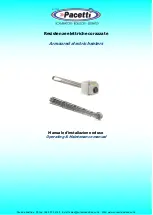
33
These guidelines should be utilized by a qualified service agent. When calling for service notify the service agent
that this is a “Flammable Vapor Ignition Resistant” Product.
proBleM
cause
solutIon
not enouGh or
no hot water
1. Blower will not run.
A) "ON/OFF" control switch turned off.
Turn switch to the "ON" position.
B) Blower unplugged.
Plug blower back into 115 vac. outlet.
C) No power at outlet.
Repair service to outlet.
D) Thermostat defective.
Replace thermostat.
E) Control harness defective.
Replace control harness.
F) High limit control circuit open.
Replace ECO.
G) Blower motor defective.
Replace blower assembly.
3. Thermostat problems
A) Thermostat set too low.
Turn temperature control higher.
B) Thermostat or ECO defective.
Replace thermostat or ECO as required.
4. Others
A) Heater undersized.
Reduce hot water use.
B) Low gas pressure.
Contact dealer.
C) Incoming water is unusually cold.
Allow more time for heater to reheat.
D) Leaking hot water pipes or fixtures.
Have plumber check and repair leaks.
vent pIpe too hot
(aBove 170° f)
Defective air flow restrictor.
Take unit out of service immediately; call a service
representative.
Not enough dilution air to mix with flue gases in inlet elbow.
Proper dilution air must be provided for combustion and dilution of
flue temperature. Refer to the "INSTALLING THE NEW WATER
HEATER" section in the manual.
Dilution air too hot for mixing with flue gases.
Supply air is too hot. Check for heat sources around intake
terminal and blockage of dilution air leg.
Wrong burner orifice.
Install correct orifice.
Yellow flaMe
Dirt in burner ports.
Turn off heater and gas, clean burner head.
Combustion air path restricted.
Check intake venting arrangement for obstructions.
Not enough dilution air for proper combustion.
Check intake venting arrangement for obstructions.
condensatIon
Water on the floor under heater.
See "CONDENSATION" section.
Water dripping from blower assembly.
Provide drip "TEE" to catch condensation from horizontal section
of exhaust vent close to blower assembly.
water leaKs
Improperly sealed hot or cold supply connections, relief
valve, drain valve or thermostat threads.
Tighten threaded connections.
Leakage from other appliances or water lines.
Inspect other appliances near water heater.
Condensation of flue products.
See "CONDENSATION" section.
leaKInG t & p valve
Thermal expansion in closed water system.
Install thermal expansion tank (DO NOT plug T & P valve).
Improperly seated valve.
Check relief valve for proper operation (DO NOT plug T & P
valve).
hot water odors (refer to
cathodIc protectIon)
High sulfate or mineral content in water supply.
Drain and flush heater thoroughly then refill.
Bacteria in water supply.
Chlorinate water supply.
water too hot
Thermostat set too high.
Refer to "TEMPERATURE REGULATION" section.
water heater sounds
sIZZlInG - ruMBlInG
Condensation dripping on burner.
See "CONDENSATION" section.
Sediment at bottom of heater tank.
Clean sediment from tank. Refer to "DRAINING" instructions in
the "MAINTENANCE" section.
sootInG
Improper combustion.
Refer to the "COMBUSTION AIR AND VENTILATION"
section.
heater lIGht Goes out
In 4–5 seconds
Outlet polarity is reversed.
Test polarity and correct.
vent Gas odors
Lack of air supply.
Immediately shut down the water heater and contact a service
agency to determine cause.
Improperly installed vent piping.
Downdraft.
Poor Combustion.
trouBleshootInG GuIdelInes
trouBleshootInG GuIdelInes




































